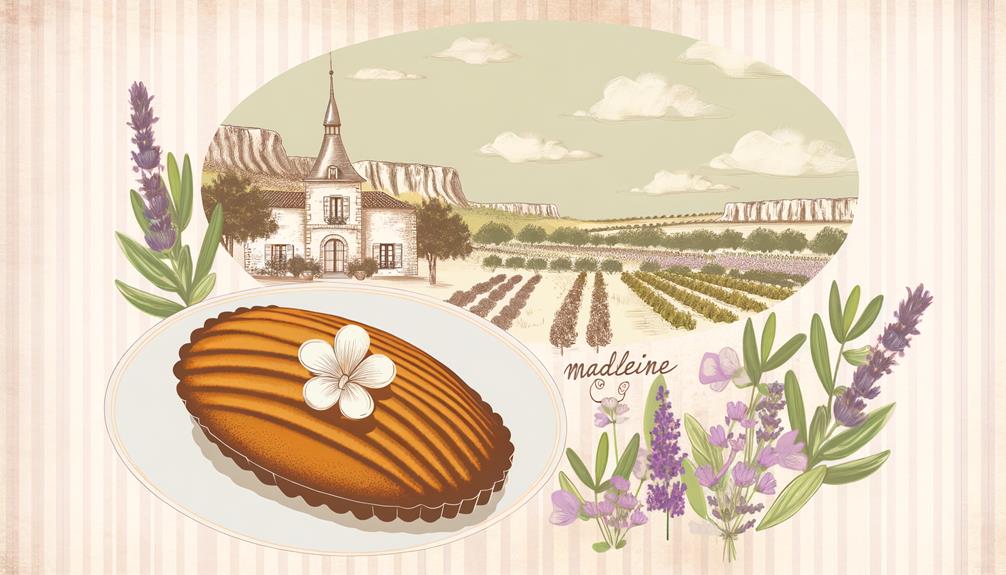Madeleine Name Meaning and Origin
Madeleine, deriving from the Hebrew name Magdalene, means 'woman from Magdala' and has French origins. This name is intricately tied to Mary Magdalene, a significant biblical figure.
Its evolution showcases linguistic adaptations from Aramaic to Latin, then into Old French. Madeleine rose to prominence in Europe during the Middle Ages, reflecting religious reverence and cultural shifts.
The name carries connotations of elegance, purity, and devotion, often featured in literature and art. Pronounced differently across cultures, it retains a melodic and sophisticated appeal.
For further exploration of its cultural significance and global variations, deeper insights await.

Key Takeaways
- Madeleine originates from the Hebrew name Magdalene, meaning 'woman from Magdala.'
- The name is deeply tied to Mary Magdalene in Christian tradition.
- It evolved from the Latin 'Magdalena' through Old French.
- Madeleine symbolizes elegance and sophistication in French culture.
- Variations include Maddalena (Italian), Magda (Slavic), and Maddy (English).
Linguistic Roots
The name Madeleine is derived from the Hebrew name Magdalene, which itself originates from the Aramaic word 'Magdala,' meaning 'tower' or 'elevated, great.' This etymological pathway underscores the name's deep-rooted significance in ancient languages.
The change from 'Magdala' to 'Magdalene' highlights the linguistic evolution influenced by cultural and geographical shifts. Hebrew, being a Semitic language, often incorporated Aramaic expressions, creating rich, layered meanings. The semantic shift from a geographical identifier, Magdala, to a personal name, Magdalene, reflects broader sociolinguistic trends.
Besides, the shift into the French 'Madeleine' showcases the fluidity of linguistic adaptation across different cultures and epochs. Such linguistic roots reveal the intricate tapestry of meaning and historical connotations embedded within the name Madeleine.
Historical Background
The historical background of the name Madeleine is deeply intertwined with its French origins and the cultural influence of France across Europe.
Additionally, the name holds significant religious connotations, prominently linked to Mary Magdalene, a prominent figure in Christian tradition, which has further permeated literary works throughout history.
This combination of linguistic, religious, and literary factors has solidified Madeleine's enduring presence and popularity.
French Origins and Influence
Rooted in the rich tapestry of French history, the name Madeleine traces its origins to the biblical figure Mary Magdalene, whose story has profoundly influenced French culture and linguistics.
The adoption of Madeleine in France during the medieval period reflects the country's deep Christian heritage and the veneration of saints. The name became widely popular in the Middle Ages, symbolizing penitence and redemption, aligning with the Catholic Church's teachings.
Linguistically, Madeleine evolved from the Latin 'Magdalena,' through Old French, achieving its modern form. It epitomizes the intertwining of religious reverence and linguistic adaptation, demonstrating how historical and cultural forces shape nomenclature.
The name's enduring appeal underscores France's historical penchant for names with significant spiritual and cultural resonance.
Religious and Literary Connections
In examining Madeleine's religious and literary connections, one finds its profound association with Mary Magdalene, a pivotal figure in Christian theology and a subject of extensive literary discourse. Mary Magdalene, often considered a devoted follower of Jesus Christ, is depicted in various canonical and apocryphal texts, enhancing the name's spiritual significance.
The portrayal of Mary Magdalene in art and literature, from Dante's 'Divine Comedy' to Dan Brown's 'The Da Vinci Code,' underscores her enduring cultural resonance. Moreover, her depiction as a penitent sinner and witness to the resurrection has imbued the name Madeleine with connotations of redemption and steadfast faith.
Through centuries, these associations have cemented Madeleine's stature in both religious traditions and literary narratives.
Cultural Significance
Exploring the cultural significance of the name Madeleine reveals its rich historical associations and enduring influence across various societies. Rooted in French tradition, Madeleine evokes images of elegance and sophistication, often linked to the revered French pastry, the madeleine cake.
The name's biblical origins, tracing back to Mary Magdalene, underscore its spiritual resonance. In literature and arts, Madeleine frequently symbolizes purity and devotion, as seen in Marcel Proust's 'In Search of Lost Time,' where a madeleine cake triggers profound memories.
This name also permeates popular culture, featuring in films, music, and television, illustrating its versatility and timeless appeal. Therefore, Madeleine's cultural footprint is both expansive and deeply ingrained, reflecting a blend of historical depth and contemporary relevance.
Popularity Over Time
The cultural resonance of the name Madeleine is further reflected in its fluctuating popularity over time, revealing trends that mirror societal shifts and historical contexts. Analyzing data from various periods, one can observe the ebb and flow in its usage, often influenced by prominent cultural moments and notable figures.
- 19th Century: Moderate popularity, often used in literary contexts.
- Early 20th Century: Decline, coinciding with global events like World War I.
- Mid-20th Century: Resurgence, potentially linked to post-war optimism.
- Late 20th Century: Peak in usage, possibly due to media influences.
- 21st Century: Steady decline, reflective of contemporary naming trends.
This analytical lens provides valuable insight into how the name Madeleine has evolved in public consciousness.
Famous Namesakes
The name Madeleine has been borne by numerous renowned individuals, spanning both historical significance and contemporary popular culture. Figures such as Madeleine Albright, the first female U.S. Secretary of State, exemplify its historical prestige, while characters like Madeleine from Ludwig Bemelmans' beloved children's book series highlight its enduring appeal in popular media.
These namesakes illustrate the name's versatility and enduring legacy across various domains.
Renowned Historical Figures
Several influential women throughout history have borne the name Madeleine, each making a substantial impact on their respective fields. Their contributions span various domains, from politics and diplomacy to science and the arts.
Significantly, these women have set precedents in their sectors, demonstrating the enduring legacy of the name Madeleine.
- Madeleine Albright: The first female U.S. Secretary of State, known for her pivotal role in shaping American foreign policy.
- Madeleine Vionnet: An innovative French fashion designer, credited with pioneering the bias cut technique.
- Madeleine Sophie Barat: Founder of the Society of the Sacred Heart, influential in education.
- Madeleine Brès: The first French woman to earn a medical degree.
- Madeleine L'Engle: Acclaimed author of 'A Wrinkle in Time,' impacting literature and young adult fiction.
These figures illustrate the name's rich historical significance.
Popular Culture Icons
In contemporary popular culture, numerous celebrated individuals named Madeleine have achieved remarkable success across various entertainment and media industries. Notably, Madeleine Stowe, an American actress, has garnered acclaim for her compelling performances in films such as 'The Last of the Mohicans' and the TV series 'Revenge.'
Equally influential, Madeleine Albright, the first female U.S. Secretary of State, has been a pivotal figure in international diplomacy, frequently appearing in media discussions.
Additionally, Madeleine L'Engle, the celebrated author of 'A Wrinkle in Time,' has left an indelible mark on literature and continues to inspire through her works. These figures exemplify the diverse talents and significant contributions made by individuals named Madeleine in contemporary culture.
Variations and Nicknames
Many variations and nicknames of the name Madeleine have emerged across different cultures and languages, reflecting its widespread popularity and adaptability. These variations often preserve the name's elegance while infusing local linguistic characteristics, showcasing a fascinating blend of tradition and innovation.
Among the myriad of alternatives, a few stand out due to their unique phonetic and cultural adaptations:
- Magdalena: Mainly used in Spanish-speaking countries.
- Maddalena: The Italian rendition, maintaining a melodic resonance.
- Madelina: A softer, more delicate variation.
- Magda: A popular diminutive in various Slavic regions.
- Maddy: A common, affectionate nickname in English-speaking countries.
Such variations and nicknames underscore the name Madeleine's remarkable versatility and enduring charm across global cultures.
Pronunciation Guide
The pronunciation of the name Madeleine varies noticeably depending on linguistic and regional influences, with notable distinctions in vowel emphasis and consonant articulation.
In English-speaking regions, it is commonly rendered as 'MAD-eh-lin,' emphasizing the first syllable and softening the terminal 'e'.
French pronunciation, 'mah-duh-LEN,' places stress on the final syllable, often blending the vowels for fluidity.
Germanic variations, such as 'MAH-duh-layn,' feature a distinct articulation of the 'l' and 'n'.
This phonetic diversity reflects the cultural adaptations of the name, making it a fascinating subject of linguistic study.
Understanding these nuances enhances our appreciation of the name's historical and cultural richness, underscoring the interplay between language and identity.
Modern Usage
Modern usage of the name Madeleine reveals a resurgence in its popularity, driven by cultural influences and a renewed appreciation for classic, elegant names. The name has been embraced for its timeless appeal and sophisticated sound, making it a favored choice in various parts of the world.
Key factors contributing to its modern popularity include:
- Cultural references: Portrayals in literature, film, and television.
- Celebrity influence: Adoption by notable personalities.
- Historical allure: Connection to historical figures and royal lineage.
- Phonetic appeal: The melodious and refined pronunciation.
- Global reach: Versatility and acceptance across different languages and cultures.
This renewed interest underscores a broader trend towards names that convey historical depth and aesthetic grace.
Conclusion
In summation, the name Madeleine, with its rich linguistic roots and historical background, has woven itself into the cultural and social fabric across centuries. Its enduring popularity and the array of notable namesakes attest to its timeless appeal.
Variations and nicknames further demonstrate its adaptability across different cultures and eras. The intricate tapestry of its usage underscores a name that is both historically resonant and contemporaneously relevant, encapsulating a legacy that continues to evolve with time.






